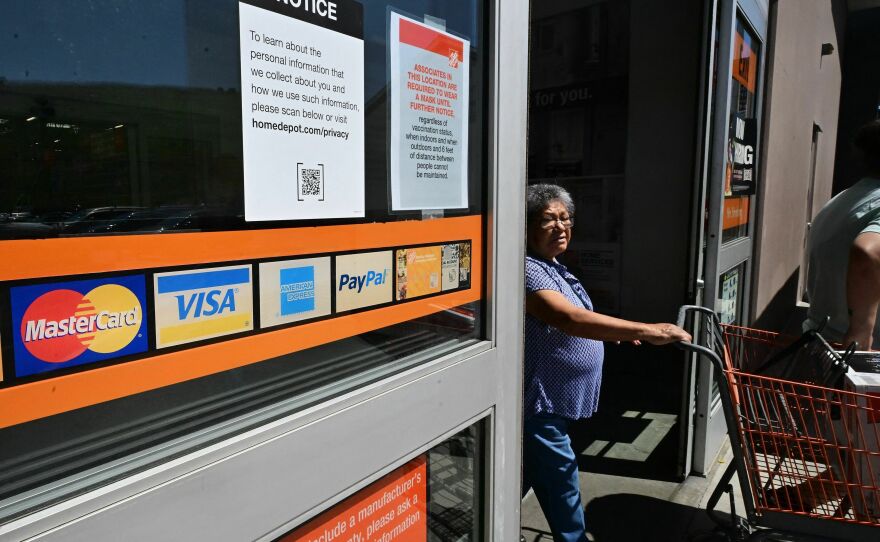Whenever someone uses a credit card to buy a scoop of mango ice cream at one of Victor Garcia's shops in Texas, the financial system takes a bite.
Credit card fees gobbled up more than $25,000 of Garcia's sales last year. He's now posted signs at his two shops near Fort Worth urging customers to think twice before paying with plastic.
"Most are shocked," Garcia says. "Half of them say, 'Gosh, I have no cash. I wish I did.' People don't know. They just say, 'Hey, I get points, so I'm going to use my card.'"
Retailers have long complained the so-called "swipe fees" they have to pay for accepting credit cards in the U.S. are much higher than those in Europe, where the fees are strictly regulated.
The grumbling has gotten louder since the pandemic, as more customers have switched from paying with cash to credit cards.
U.S. retailers now pay about $160 billion a year in swipe fees, according to the Merchants Payments Coalition, a group that is looking to reduce those fees. That total has increased more than 50% since 2020, says Doug Kantor, who serves on the coalition's executive committee.
Some lawmakers are hoping to reduce swipe fees by promoting increased competition in the processing of credit card transactions. The bill they've drafted has triggered a high-stakes tug of war between retailers and the financial sector, with largely unwitting consumers stuck in the middle.
Reverse Robin Hood
Every time someone buys something with a credit card — at a gas station, a grocery store or online — the retailer pays a "swipe fee," typically around 2.25%. Some of that money goes to the bank that issued the credit card. Some goes to Visa or Mastercard for processing the sale. And some of it might be kicked back to the customer as a "reward."
Some gas stations and other businesses add a surcharge for customers who use credit cards to cover the swipe fee. But most retailers just raise their prices, spreading the cost of swipe fees among all their customers, whether they're paying with plastic or not.
"In general, these fees are just baked into the cost of everything we buy," says Kantor, who is general counsel for the National Association of Convenience Stores. "Even consumers who are cash-payers and maybe can't even qualify for a credit card pay more for every good that they buy than they really should."
When a customer with a rewards card makes a purchase, the swipe fee is usually even higher. So lower-income cash customers are effectively subsidizing the airline tickets, resort stays and other rewards that go to better-off card-users — a $15 billion-a-year transfer that some have described as Robin Hood in reverse.
"It is unfortunately a very unjust system and one that's hidden from most of us so that we really don't even know what's happening," Kantor says.

The Visa-Mastercard duopoly
Swipe fees are set by the Visa and Mastercard networks, which dominate the market for processing credit cards. Fees in the U.S. are eight or nine times as high as those in Europe, says Stanford finance professor Chenzi Xu.
Some big retailers have the clout to bargain for lower fees. Costco, for example, gets a break for accepting only Visa cards in its stores. But most retailers have little choice but to pay whatever Visa and Mastercard demand.
"If you happen to walk in with just a Mastercard, they don't want to give up on your purchase," Xu says. "So the way they deal with these large fees is that they just pass on the prices to their products."
A bipartisan group of lawmakers is pushing a bill that would require big credit card issuers to allow a network other than Visa and Mastercard to process transactions, in hopes the competition would lead to lower fees.
Banks and the credit card networks are pushing back, arguing the measure would jeopardize security and credit card rewards.
"We're going to prevail because I think Americans love their rewards," says Richard Hunt, executive chairman of the Electronic Payments Coalition. "Look, if the merchant doesn't want the credit card, there are other alternatives. Cash or checks. But we know America loves their credit cards."
Victor Garcia knows that, too. He's tried offering a discount to people who pay cash at his ice cream stores and even set prices in whole dollar amounts so customers don't have to juggle change. None of it's made much difference. His swipe fee bill keeps going up.
"That's a really hard thing to try to say, 'Hey, we're going to go out and try to change consumer habits,'" he says. "We said OK, we're going to let that fee be a part of, basically build it into the price."
Copyright 2023 NPR. To see more, visit https://www.npr.org. 9(MDAzMjM2NDYzMDEyMzc1Njk5NjAxNzY3OQ001))







